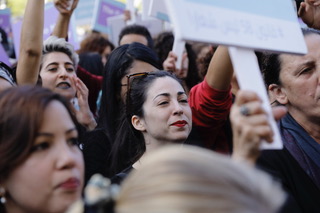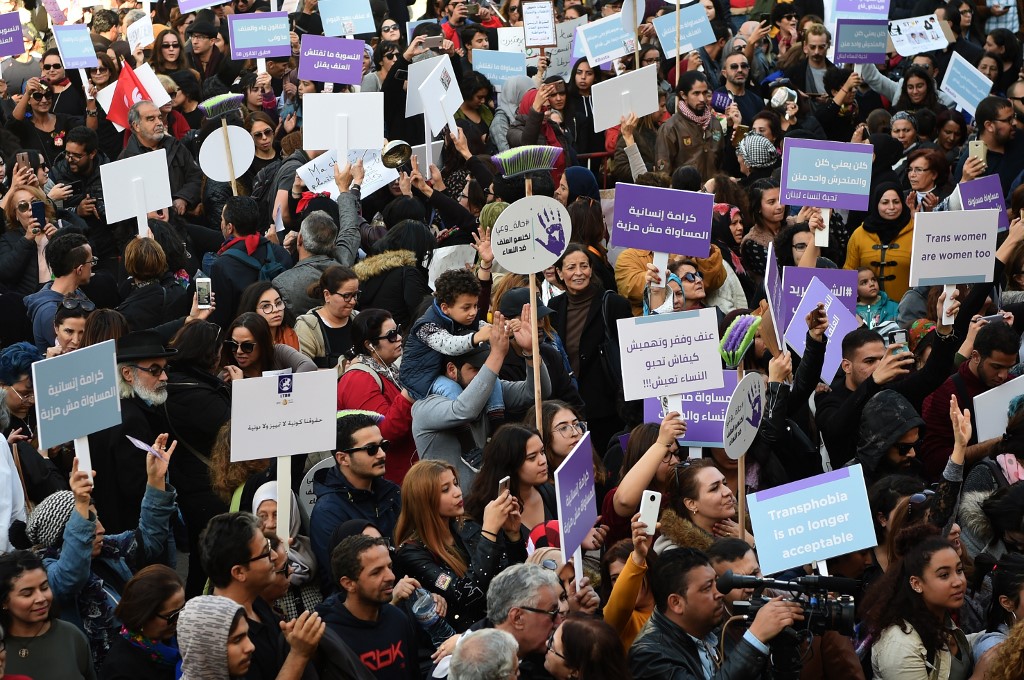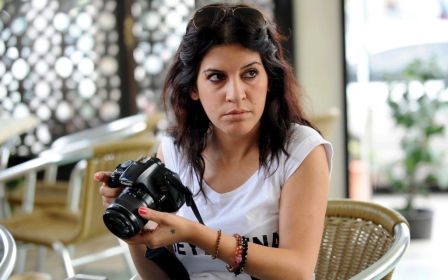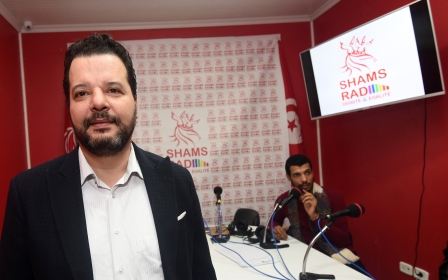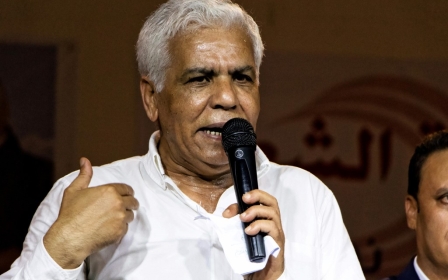#EnaZeda: Tunisian 'Me Too' movement met with both support and smear tactics
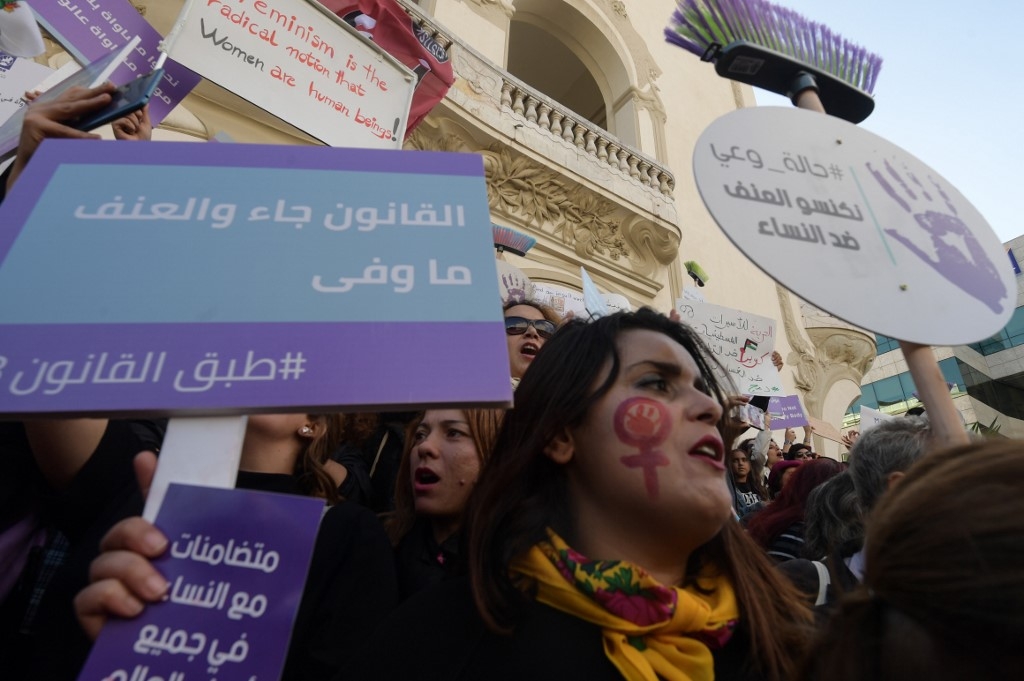
A Facebook page has ushered in a powerful feminist movement in Tunisia, prompted by a high-school student's sexual harassment complaint.
According to its founders, the page EnaZeda - which means "Me Too" in Tunisian Arabic - was set up in October after a 19-year-old student shared pictures of MP Zouheir Makhlouf allegedly masturbating in his car outside her high school in a bid to harass her.
The Facebook page has the title of the viral hashtag #EnaZeda that followed the incident.
Sonia Miled, founder of the EnaZeda movement and PR manager for the feminist association Aswat Nissa ("Women's voices"), told Middle East Eye that while a public page existed, her organisation ran a private page with the same name to "provide a safe space for sexual assault victims".
New MEE newsletter: Jerusalem Dispatch
Sign up to get the latest insights and analysis on Israel-Palestine, alongside Turkey Unpacked and other MEE newsletters
It now has 32,648 members and receives about 40 new stories daily, she said.
Five months after the creation of the page, thousands of Tunisians are feeling emboldened to speak out on social media and beyond to convey their experiences of being sexually harassed, groped, molested or raped in schools, workplaces, on public transport or in public places.
"This time, the silence has been forever broken," feminist activist Amal Bintnadia, a moderator of the public Facebook page and a co-founder of the new movement Fagatna ("We are fed up"), told MEE.
Lawyer Donia Ben-Osman, who represents the student, said the girl was not aware of who the MP was before disseminating the images of him.
"Things took an unexpected turn when my client posted the pictures on a closed Facebook group to alert her classmates, without knowing who her harasser was," Ben-Osman told MEE.
Makhlouf denies the accusations, saying he was rubbing cream after he had urinated in a bottle, as he is diabetic.
Since the story broke, several sexual harassment stories have appeared in the media.
Harassment at school
The decision to speak out against sexual harassment in Tunisia, however, is often controversial.
In one case, a teacher at the Rue de Russie high school in the centre of Tunis was detained on charges of sexually harassing a female student.
However, when another teacher, Jamila Chemlali, supported the harassed student, she was subjected to threats and intimidation by her colleagues, according to Aswat Nissa.
Chemlali told MEE that her colleagues and parents of students would rather cover up the cases to preserve their reputation.
Aswat Nissa, which supports Chemlali's case, said the teacher has faced a public smear campaign because she helped the student submit a complaint to the school administration.
Chemlali, however, said she will not succumb to the pressure.
"This has to stop. It is my personal mission to make girls speak up. I am more proud than scared," she told MEE.
'Malicious' case
The case has divided the school, with colleagues of the detained teacher going on a brief strike on 17 January, demanding his immediate release.
Tunisia's powerful UGTT labour union also backed the accused teacher, criticising the case as "malicious".
While expressing the union's support for campaigns against sexual harassment, a statement by its regional branch suggested the case was politically motivated.
The teacher was provisionally released on 13 February, with his trial postponed until 8 April.
The UGTT regional page posted footage of his reception at school, with the caption: "Truth must see the light."
Among those who came out as victims after the EnaZeda campaign was Saida Ounissi, a former minister and an MP from the Ennahda party.
She has voiced her support for the movement by coming out as a sexual harassment victim.
"Being a role model" was Ounissi's intention when she decided to make her story public.
Ounissi said that when she was 12 years old, she was sexually harassed by "a man in a white car" in a similar manner as the student who complained about Makhlouf.
"Who knows how many victims Zouheir Makhlouf had? I hope to inspire other women to come forward. Maybe it would strengthen them to know it happened to me too," Ounissi told MEE.
The hypocrisy is terrible. Suspects of kissing in public are instantly given three months in jail but the case against a male MP has been brought to a complete standstill
- Donia Ben-Osman, lawyer
"For far too long, sexual assault victims have been silenced by their surroundings, out of shame or fear of standing out," she said.
Despite her public statements, Ounissi said the EnaZeda movement has treated her "with mistrust".
"The religious and Islamic stigma attached to sexual violence makes it very difficult to have an open discussion with EnaZeda," Ounissi told MEE.
The Ennahda MP, however, backed her political group as a defender of women's rights.
"Our religious obligations teach us how to respect the integrity of the body," Ounissi said.
"Imams and teachers could be leaders in the fight against sexual assault and play a key role in encouraging women to come forward."
EnaZeda 'undermining justice'
The fact that the Makhlouf case has come to a standstill even though the public prosecutor has opened a public indecency and sexual harassment case against the MP without waiting for a formal complaint pushes Ben-Osman to remain vigilant.
"This is not OK. Something involving money, power and status is going on. A deal with the justice department wouldn't surprise me," Ben-Osman said.
But some believe that the movement is unfairly targeting Tunisia's justice system and is likely to have negative impacts on society.
"I am not an antifeminist, but these aggressive women are becoming a peril to national unity," civil society activist Rafik Nour Ben-Kilani, an ally of Makhlouf, told MEE.
"We have to stand shoulder to shoulder to realise the objectives of the 2011 revolution,” he added, expressing confidence in the legal system.
"The EnaZeda movement is undermining justice. Why would a freely elected MP of the second-biggest party like Makhlouf risk his career?" Ben Kilani said.
"The feminist movement destroyed his family. His son is afraid to go to school, and his daughter tried to commit suicide."
'Seeing is believing'
The first anti-sexual harassment campaign, "I have been sexually molested too," was launched in 2014 with the aim of getting women to talk, Amal Bintnadia, a moderator of EnaZeda's Facebook page, told MEE.
It was followed by a series of other campaigns, amongst which was EnaZeda. While EnaZeda was initially created in 2017 following the emergence of the "Me Too" movement, it gained prominence in 2019.
"The campaign EnaZeda seems by far the most effective," she said.
But the history of the struggle goes further back. In the 1990s, it was the feminist organisation the Tunisian Association of Democratic Women (AFTD) that put sexual violence against women on the political agenda.
"To be fair, it was largely through their battle that the bill to counter violence against women took effect in 2018," Bintnadia said.
Despite the bill, Ben-Osman still has low expectations.
"Seeing is believing. So far, nothing has been put in place yet. The police still oftentimes advise women to drop their cases," Ben-Osman told MEE.
For the lawyer, the Tunisian justice system is lagging behind with social changes.
"The hypocrisy is terrible. Suspects of kissing in public are instantly given three months in jail, but the case against MP Makhlouf has been brought to a complete standstill," she said.
Middle East Eye delivers independent and unrivalled coverage and analysis of the Middle East, North Africa and beyond. To learn more about republishing this content and the associated fees, please fill out this form. More about MEE can be found here.


